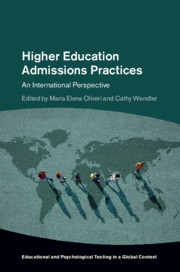Book contents
- Higher Education Admissions Practices
- Educational and Psychological Testing in a Global Context
- Higher Education Admissions Practices
- Copyright page
- Contents
- Figures
- Tables
- Contributors
- Series Editor’s Foreword
- Foreword
- Acknowledgments
- Part I Global Challenges and Common Admissions Models
- Part II Country-Specific Admissions Practices
- Chapter 7 Admissions Policies and Practices and the Reshaping of Access Patterns to Higher Education in Africa
- Chapter 8 Chile’s Admissions Tests: Pending Changes and Revisions
- Chapter 9 Issues of Perceived Fairness in Admissions Assessments in Small Countries: The Case of the Republic of Cyprus
- Chapter 10 Higher Education Admissions Practices in Israel
- Chapter 11 Access, Equity, and Admissions in South African Higher Education
- Chapter 12 Admissions Practices in Sweden
- Chapter 13 Revisions of Admissions Testing in Vietnam: From Elite to Mass Higher Education
- Part III Assessments Used in Higher Education Admissions
- Part IV Rethinking Higher Education Admissions
- Index
- References
Chapter 11 - Access, Equity, and Admissions in South African Higher Education
from Part II - Country-Specific Admissions Practices
Published online by Cambridge University Press: 09 January 2020
- Higher Education Admissions Practices
- Educational and Psychological Testing in a Global Context
- Higher Education Admissions Practices
- Copyright page
- Contents
- Figures
- Tables
- Contributors
- Series Editor’s Foreword
- Foreword
- Acknowledgments
- Part I Global Challenges and Common Admissions Models
- Part II Country-Specific Admissions Practices
- Chapter 7 Admissions Policies and Practices and the Reshaping of Access Patterns to Higher Education in Africa
- Chapter 8 Chile’s Admissions Tests: Pending Changes and Revisions
- Chapter 9 Issues of Perceived Fairness in Admissions Assessments in Small Countries: The Case of the Republic of Cyprus
- Chapter 10 Higher Education Admissions Practices in Israel
- Chapter 11 Access, Equity, and Admissions in South African Higher Education
- Chapter 12 Admissions Practices in Sweden
- Chapter 13 Revisions of Admissions Testing in Vietnam: From Elite to Mass Higher Education
- Part III Assessments Used in Higher Education Admissions
- Part IV Rethinking Higher Education Admissions
- Index
- References
Summary
Promoting student access in higher education institutions in South Africa remains a challenge given the limitations and resources that institutions face. The chapter presents a brief history of schooling in South Africa, describes the transition towards fair and equal higher education admissions, and details the policies, practices, and criteria associated with admissions. A discussion of the National Benchmark Tests is also provided. Finally, the chapter discusses issues related to ensuring access, success, and sustainability of the higher education system in South Africa.
Keywords
- Type
- Chapter
- Information
- Higher Education Admissions PracticesAn International Perspective, pp. 190 - 202Publisher: Cambridge University PressPrint publication year: 2020
References
- 2
- Cited by



